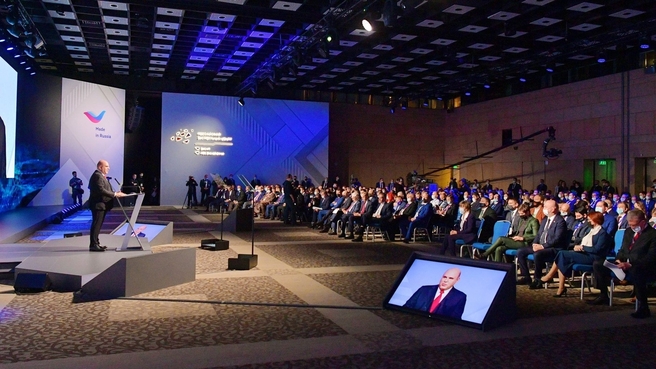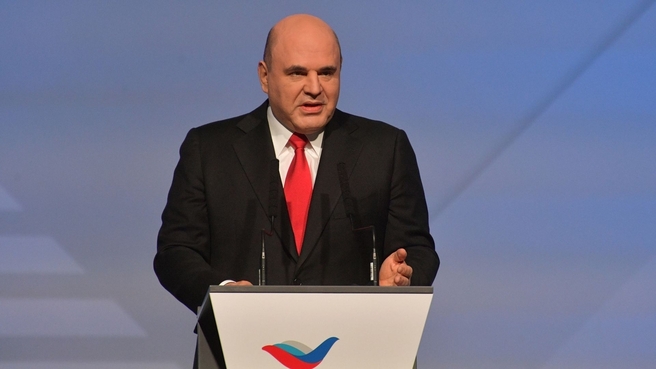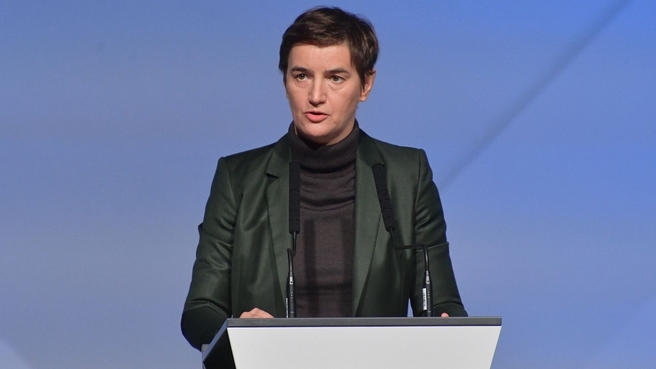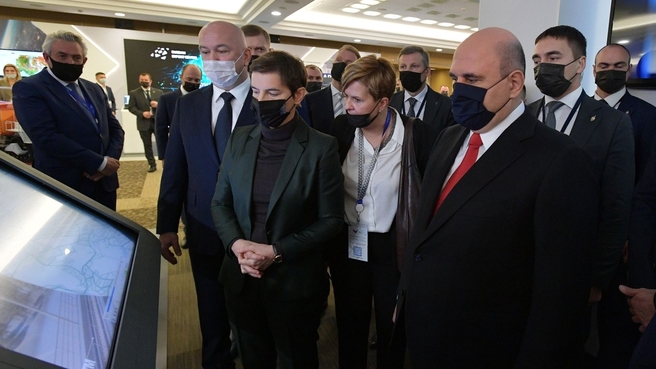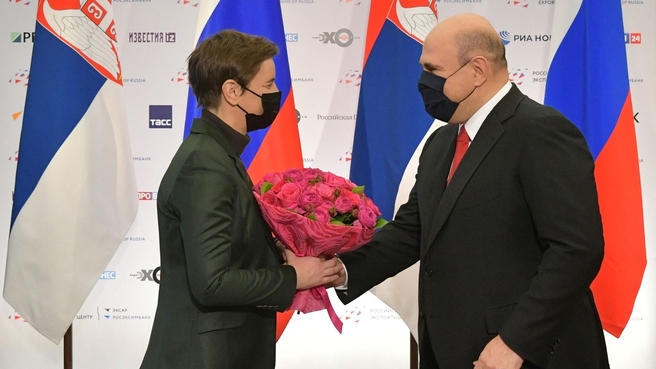Mikhail Mishustin: “The Forum is a good venue for an in-depth and constructive dialogue, discussions on topical aspects of non-commodity and non-energy exports, and finding practical solutions that will help expand the geography of exports and shipments of Russian goods and services to international markets. The President of Russia has set an ambitious goal for us: to increase the share of non-commodity and non-energy exports by at least 70 percent by 2030.”
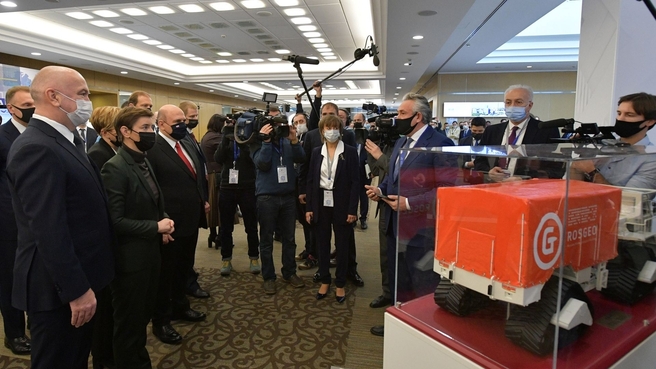
Mikhail Mishustin and Ana Brnabic visit an exhibition of high-tech goods and services by Russian exporters during the 2021 Made in Russia International Export Forum at the International Trade Centre
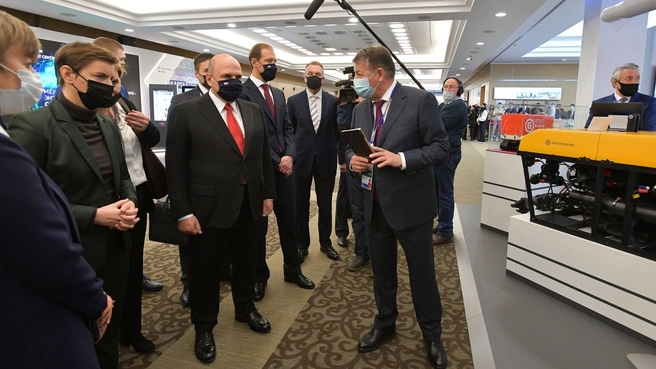
Mikhail Mishustin and Ana Brnabic visit an exhibition of high-tech goods and services by Russian exporters during the 2021 Made in Russia International Export Forum at the International Trade Centre
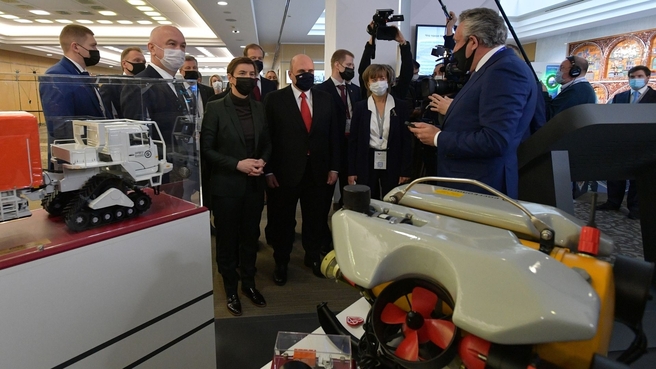
Mikhail Mishustin and Ana Brnabic visit an exhibition of high-tech goods and services by Russian exporters during the 2021 Made in Russia International Export Forum at the International Trade Centre
Mikhail Mishustin’s remarks at the 2021 Made in Russia International Export Forum
Excerpts from the transcript:
Mikhail Mishustin: Good afternoon, Ms Brnbabic. Good afternoon, esteemed participants and guests.
The Made in Russia International Export Forum has been gathering representatives of government agencies, development institutions, expert and business communities and, of course, our foreign friends for the past few years. This year, Serbia is acting as the partner country of our event, and my colleague Ana Brnabic, the Prime Minister of Serbia, is present here today.
This forum is a good venue for detailed and constructive dialogue and for discussing current issues of non-commodity and non-energy exports, finding practical solutions that will help expand the geography and volumes of the deliveries of Russian goods and services to international markets.
The main theme of today’s plenary session is: “2030 is already tomorrow. What will we do?” This probably sounds rhetorical because almost ten years are still ahead. But, indeed, this question has been put forth in a timely manner. Global economic processes are developing at a breath-taking pace, and the explosive growth of digital technologies makes us run even faster so we can move forward.
Additionally, we have to achieve an ambitious goal, set by the President of Russia, that is, boosting exports of non-commodity and non-energy goods by at least 70 percent by 2030.
It is already possible to say that global markets have mostly recovered from the pandemic-related shock. Russia has reached pre-crisis levels and even exceeded them. Non-commodity and non-energy exports are also growing and are expected to reach $180 billion in 2021, the highest figure for the past three years. It is important that our higher export volumes have exceeded global trade growth rates.
But despite this positive trend, the situation requires close attention and monitoring. A balance on foreign markets is yet to be attained. We are witnessing sharp price fluctuations. Logistics chains have been disrupted due to current health restrictions and closed borders.
Trade policies remain turbulent, and local goods shortages persist. The risks of greater protectionism are real.
The Russian economy needs to undergo substantial transformation processes in order to expand our exports of non-commodity and non-energy goods. This is feasible.
Some basic sectors, including industry and agriculture, have impressive potential. This mostly includes production with a high added value. They create points of growth and stimulate the development of adjacent sectors.
I believe that entrepreneurial initiative can and should become the main driving force in increasing the share of Russian goods in foreign trade. Of course, the government will provide essential assistance to maintain a rapid pace and to achieve our national goals.
It is important to continue creating favourable conditions for expanding sales of Russian industrial products, to facilitate the large-scale operations of our companies in foreign markets and to involve more entrepreneurs, primarily small and medium-sized businesses, in this process.
Today, less than 1 percent of Russia’s companies are export-oriented. This imbalance should be rectified. We need an integrated system for supporting industrial exporters that can adapt to buyer demand and ensure simpler and more convenient foreign operations. It should also stipulate a set of measures for helping companies at every stage of their development, including ways of reducing administrative and organisational barriers when entering foreign markets.
It is also necessary to help new exporters. In many cases they manufacture good and competitive products and are eager to find consumers abroad, but they simply don’t know how to get started and are acting by trial and error. Fears of unanticipated risk can hamper their efforts and deprive them of incentives and initiative.
These entrepreneurs should be able to obtain the useful information and additional knowledge they lack for maturing and acquiring essential practical experience more quickly.
Today, businesses, especially small businesses, also need to understand the basic operation of the e-commerce system. The e-commerce system is a powerful channel for selling goods, and businesses need to learn the easiest ways to find consumers abroad and how to deliver goods to their doorsteps.
We need to develop financial support tools so that major Russian producers can compete in terms of quality, price and well-structured financial offers they can make to their foreign partners.
The state must accomplish all these goals. This is why we are setting up a company-friendly atmosphere that will blend nicely with their business processes. Instead of creating additional difficulties, it will help them. The provision of services will become natural and, most importantly, it will not be burdensome.
The My Exports digital platform was launched for these purposes last year. This system of online services for Russian businesses can help them enter foreign markets. Businesses will be able to obtain professional support 24 hours a day.
The Government has adopted another decision. From now on, exporters will find it much easier to license dual-purpose goods that are covered by export control. This involves a completely digitalised procedure. From now on, it will be possible to submit documents and to obtain licenses online.
We need to use the opportunities offered by intra-EAEU integration. We are setting up common markets with the free movement of goods, services, investment and workforce for over 180 million consumers. We have free trade zones, including with the Republic of Serbia. We are drafting new agreements with our foreign partners. All this opens additional opportunities for Russian exporters for the delivery of competitive goods to the EAEU member countries and cooperation with their partners in the markets of third countries.
Russia manufactures high-quality goods, and it is necessary to actively market them by highlighting their advantages and reliability, to dispel myths and false stereotypes.
Foreign trade expansion is a powerful driving force for the Russian economy; it encourages new production facilities, diversifies production and creates jobs.
The Government is also overhauling development institutions in order to accomplish these tasks. This reform will facilitate well-coordinated and targeted support for businesses and will chart investment priorities.
Interesting discussions are scheduled for the forum, and I hope that they will lead to constructive proposals. It is necessary to understand how to achieve a national goal and to expand non-commodity and non-energy exports by effectively using the advantages of the Russian economy.
Certain Government officials are also present here. Following the discussions, I would like to ask my colleagues to review and analyse any proposals by exporters.
Esteemed participants and guests,
Today, the winners have received the Russian National Award, Exporter of the Year, in the field of international co-production arrangements and exports. I am pleased to note that this competition is becoming more popular. This year, it involved over 1,800 companies, the highest in its history. I am delighted to congratulate all those who have achieved excellent results, and I wish you new victories, and may you go forward with the most ambitious and innovative ideas. I wish productive work to the forum’s participants and to all of you.
